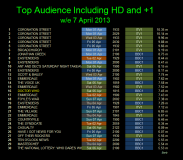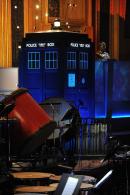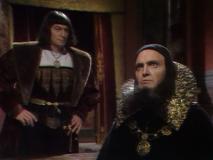 The ninth in our series of features looking at events leading to the creation of a true TV legend. The story so far: Initial planning has taken place on a new science-fiction series to run on BBC television on Saturday evenings, filling the gap between Grandstand and the pop music show Juke Box Jury. Following a meeting on 26th March 1963, chaired by script department head Donald Wilson, the script writer Cecil Edwin "Bunny" Webber produces an initial character and set-up plan, while his colleague Alice Frick writes up a report of the meeting, outlining ideas on transport, communication, themes, and format.
The ninth in our series of features looking at events leading to the creation of a true TV legend. The story so far: Initial planning has taken place on a new science-fiction series to run on BBC television on Saturday evenings, filling the gap between Grandstand and the pop music show Juke Box Jury. Following a meeting on 26th March 1963, chaired by script department head Donald Wilson, the script writer Cecil Edwin "Bunny" Webber produces an initial character and set-up plan, while his colleague Alice Frick writes up a report of the meeting, outlining ideas on transport, communication, themes, and format.It was in
April 1963, 50 years ago this month, that BBC Head of Drama
Sydney Newman, the man who had commissioned the new series, considered the initial programme suggestions. The reports, which exist in the BBC's written archives, show Newman making a number of handwritten comments showing his thoughts on the proposals. He was not keen on the idea of a flying saucer, saying it was "Not based in reality - or too Sunday press", and he dismissed the idea of a team of troubleshooters with the one emphatic word "No". Newman was keen to get a youngster involved in the action. "Need a kid to get into trouble" he wrote, and "make mistakes". In addition, he gave short shrift to Webber's thoughts on villains - the possibility of a recurring one, perhaps a politician or industrialist, or "ad hoc villains for each story, as needed" - bracketing the whole section of the plan "corny".
Overall, Newman thought the proposals from the team were too unimaginative and highbrow. He was trying to bring fresh thinking to the BBC and was worried the idea was too safe, too derivative of other BBC dramas. He felt a better model for the series would be
Pathfinders - three serials he produced at ABC - where a strong storyline was followed each week with a dramatic cliffhanger in much the same way as the classic cinema serials such as
Flash Gordon had done. Indeed, the BBC had produced similar serials, such as
Stranger From Space,
The Lost Planet, and
Return To The Lost Planet. (
Stranger From Space - part of the children's programme
Whirligig - can lay claim to being Britain's first TV sci-fi cliffhanger serial. It ran for two series in 1951 and 1952 and included in its cast
Valentine Dyall and
Peter Hawkins.)
One thing of which Newman
did approve, though, was the idea of a time machine. He later recalled:
How wonderful, I thought, if today's humans could find themselves on the shores of England seeing and getting mixed up with Caesar's army in 54BC, landing to take over the country; be in burning Rome as Nero fiddled; get involved in Europe's tragic Thirty Years War; and so on.
Newman was happy with the proposal of a handsome young man hero to lead the action, alongside a well-dressed heroine aged about 30. As noted above, he wanted a young teenager to join the action, to be a link with the many children he expected to be watching. However, it was with the third character outlined in the report - the maturer man aged 35 to 40 "with some 'character' twist" - that he had the most influence, and he set out his thoughts on this in a memo to Wilson, replacing Webber's maturer man with somebody quite different . . .
Although now lost from the archives, Newman's memo detailed the character who would lead the show and become its focus. Newman wanted a grumpy, frail, old man to be the centre of the series, a man on the run, cut off from his own faraway planet and highly advanced people from whom he had fled, stealing a time machine in the escape. Newman even gave the character a name, and in doing so, 50 years ago this month, he created one of the most iconic characters in television history. This man would simply be known as the Doctor.
By now, the script department had made way for the serials department, of which Wilson was in charge, and it was this new department that would be tasked with making the new show.


While planning the basic set-up of the series, a number of decisions were being made on a more practical level, detailing just how the series would be made and how it would be resourced. The new series had been allocated Studio D at Lime Grove. The BBC had bought the Lime Grove studio complex in 1949 as a stop-gap to provide studio space in central London while the new Television Centre was being built at White City. The studios were built for film, where they were home to the Ealing comedies and the famous British film
The Wicked Lady. Converted for use by television, they became home to many productions in the 1950s, including the famous dramatisation of
Nineteen Eighty-Four starring
Peter Cushing, as well as the comedy series
Steptoe and Son (whose title music was composed by
Ron Grainer) and the early soap opera
The Grove Family, which took its title family from the studios, was created and written by
Jon Pertwee's father and elder brother, Roland and Michael, and whose cast included
Peter Bryant.
In a memo sent on
Friday 26th April 1963, exactly 50 years ago today, Drama Group Administrator
Ayton Whitaker set out the plans for the new series. The memo gives an intended transmission date of the end of July, some four months before the series would eventually appear. It sets out the budget - £2,300 per episode - and notes how facilities such as back projection and inlay would be needed.
I understand that facilities are available for recording the Saturday serial weekly in Studio D on Fridays, starting from 5 July (Week 27), the first transmission to be in Week 31 on Saturday 27 July.
The serials, which will in all run for 52 weeks, will average six episodes and every serial will require one week's filming at the Television Film Studios. For the most part this filming will be confined to special effects, but artists, with therefore attendant wardrobe and make-up facilities, will be required on occasions. The first two serials are each of four episodes.
. . .
Moving and Still BP [back projection] will be required in the studio on all recording days, so there should be a block booking for 52 weeks, starting on the Friday of Week 27. Inlay and overlay will also be required as a regular facility.
The series will cost £2,300 per episode, and an additional £500 will be needed to build the space/time machine which will be used throughout the 52 weeks.
He is subsequently told that the design department should be able to cope with the new series, so long as no more than 500 man-hours on the first episode and 350 man-hours per successive instalment are needed.
Compiled by:
Marcus and John Bowman
 Journey to the Centre of the TARDIS achieved an overnight audience of 4.9 million viewers, a share of 26.7% of the total TV audience.
Journey to the Centre of the TARDIS achieved an overnight audience of 4.9 million viewers, a share of 26.7% of the total TV audience.
 The ninth in our series of features looking at events leading to the creation of a true TV legend.
The ninth in our series of features looking at events leading to the creation of a true TV legend.
 While planning the basic set-up of the series, a number of decisions were being made on a more practical level, detailing just how the series would be made and how it would be resourced. The new series had been allocated Studio D at Lime Grove. The BBC had bought the Lime Grove studio complex in 1949 as a stop-gap to provide studio space in central London while the new Television Centre was being built at White City. The studios were built for film, where they were home to the Ealing comedies and the famous British film The Wicked Lady. Converted for use by television, they became home to many productions in the 1950s, including the famous dramatisation of Nineteen Eighty-Four starring
While planning the basic set-up of the series, a number of decisions were being made on a more practical level, detailing just how the series would be made and how it would be resourced. The new series had been allocated Studio D at Lime Grove. The BBC had bought the Lime Grove studio complex in 1949 as a stop-gap to provide studio space in central London while the new Television Centre was being built at White City. The studios were built for film, where they were home to the Ealing comedies and the famous British film The Wicked Lady. Converted for use by television, they became home to many productions in the 1950s, including the famous dramatisation of Nineteen Eighty-Four starring 







 Final ratings data for the week ending 7th April 2013 released by the Broadcasters’ Audience Research Board, or
Final ratings data for the week ending 7th April 2013 released by the Broadcasters’ Audience Research Board, or 























